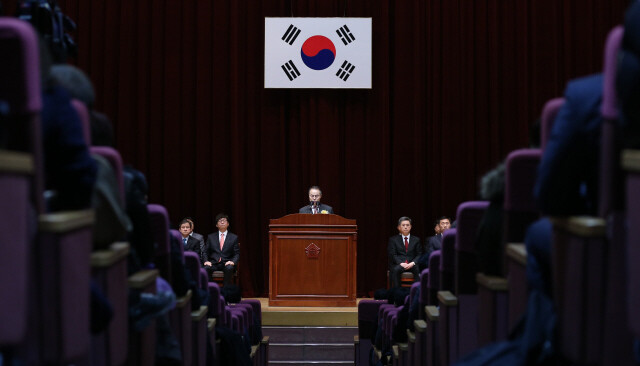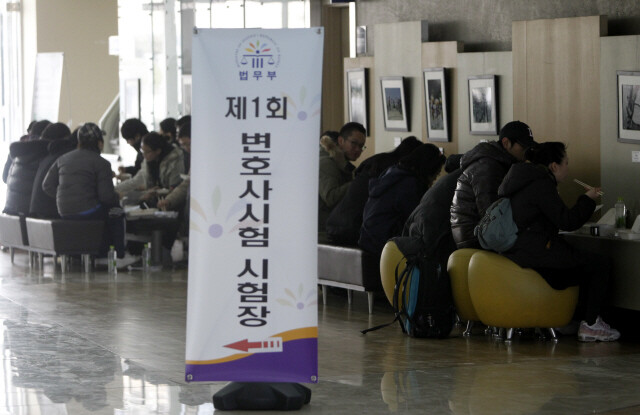hankyoreh
Links to other country sites 다른 나라 사이트 링크
Study: law school more and more a way for children of the wealthy to become lawyers

The lawyers who attended the law schools that opened in 2009 or who passed the legal service exam and attended the government’s Judicial Research and Training Institute come from the top 10% of households with an average monthly income of more than 10 million won (US$9,080), a study shows.
The study backs up the commonly held view that children of the wealthy are gradually coming to dominate law, one of South Korea’s most elite professions.
On June 22, a team of researchers at Seoul National University (Lee Jae-hyeop, professor of law; Lee Jun-ung, professor of communication; and Hwang Hyeon-jeong, doctoral student in communication) are publishing a paper titled “Lawyers from Law Schools: Who Are They?” The paper analyzes the results of a survey that asked 1,020 lawyers about their university and major, their parents’ academic background and career, their household income, their educational assessment, and their professional reputation.
According to the paper, lawyers who attended law school and lawyers who studied at the government institute during the same period after 2009 came from families with an average monthly household income of 10.63 million won and 10.89 million won, respectively.
This was about 150% higher than the average household income (4.3 million won) in South Korea for families with two or more people according to Statistics Korea last year. These figures represent the country’s top 10% income bracket.
The researchers conducted the survey through interviews and email exchanges with 308 individuals who entered law school between 2009 and 2011, 300 who enrolled in the government institute between 2009 and 2012, and 412 who enrolled in the institute in 2008 or before.
There was little difference in the educational background of parents of those who attended those who attended the government institute.
The percentage of fathers who had completed a bachelor’s degree or above was 67.5% for graduates of law school and 62.9% for graduates of the institute. The percentage of mothers who had done the same was 52% for graduates of law school and 42.8% for graduates of the institute.
This does show a huge contrast with the percentage of South Koreans of the same age (55-64) who have completed a bachelor’s degree or above - just 11%, according to a 2012 analysis of educational indicators for South Korea by the OECD (Organization for Economic Cooperation and Development).
The percentage of law school graduates with at least one parent that is a manager or executive was 24.7%, which was 10% points higher than graduates of the government institute (14.7%). There was no significant difference between the percentage of law school graduates (18.5%) and institute graduates (16.7%) whose parents were in professional fields such as medicine or law.
While little difference can be seen between lawyers who attended law school and the government institute during the same time period, there is a starker difference in earlier generations. Only 9.9% of lawyers who enrolled in the institute in 2002 or before had parents who were managers or executives, and only 7.7% had parents who were working in professional fields. Furthermore, only 17.8% had legal practitioners among their family or relatives, showing a large contrast with law school graduates (26.3%) and graduates of the institute since 2003 (29.7%).
The number of students admitted to the government institute after passing the legal service exam has shrunk since the introduction of law schools in 2009, and the exam itself is supposed to be eliminated in 2017.
Following recent claims that law schools are becoming a means for the children of the wealthy to enter the legal profession, there is growing debate between supporters of law schools and supporters of the exam about whether the legal service exam should be retained.
With its publication coming amid this debate, this study’s empirical comparison of the differences in socio-economic background of law school graduates and those who passed the legal service exam shows that both routes are failing to serve as a means of upward social mobility.
Responding to this issue, the researchers propose the need for institutional changes, such as having law schools more aggressively select members of minorities and vulnerable sectors of society.
“Even if the law school system had not been introduced, a large number of individuals from privileged socio-economic backgrounds would have entered the legal field through the legal service exam and the government institute. We hope that this study will create an opportunity for a vibrant public discussion of the law school system,” Lee Jae-hyeop, lead author of the study, told the Hankyoreh during an interview.

By Seo Young-ji, staff reporter
Please direct questions or comments to [english@hani.co.kr]

Editorial・opinion
![[Column] Has Korea, too, crossed the Rubicon on China? [Column] Has Korea, too, crossed the Rubicon on China?](https://flexible.img.hani.co.kr/flexible/normal/500/300/imgdb/original/2024/0419/9317135153409185.jpg) [Column] Has Korea, too, crossed the Rubicon on China?
[Column] Has Korea, too, crossed the Rubicon on China?![[Correspondent’s column] In Japan’s alliance with US, echoes of its past alliances with UK [Correspondent’s column] In Japan’s alliance with US, echoes of its past alliances with UK](https://flexible.img.hani.co.kr/flexible/normal/500/300/imgdb/original/2024/0419/2317135166563519.jpg) [Correspondent’s column] In Japan’s alliance with US, echoes of its past alliances with UK
[Correspondent’s column] In Japan’s alliance with US, echoes of its past alliances with UK- [Editorial] Does Yoon think the Korean public is wrong?
- [Editorial] As it bolsters its alliance with US, Japan must be accountable for past
- [Guest essay] Amending the Constitution is Yoon’s key to leaving office in public’s good graces
- [Editorial] 10 years on, lessons of Sewol tragedy must never be forgotten
- [Column] A death blow to Korea’s prosecutor politics
- [Correspondent’s column] The US and the end of Japanese pacifism
- [Guest essay] How Korea turned its trainee doctors into monsters
- [Guest essay] As someone who helped forge Seoul-Moscow ties, their status today troubles me
Most viewed articles
- 1[Column] The clock is ticking for Korea’s first lady
- 2After 2 months of delayed, denied medical care, Koreans worry worst may be yet to come
- 3US overtakes China as Korea’s top export market, prompting trade sanction jitters
- 4[Column] Has Korea, too, crossed the Rubicon on China?
- 5[Correspondent’s column] In Japan’s alliance with US, echoes of its past alliances with UK
- 6Hong Se-hwa, voice for tolerance whose memoir of exile touched a chord, dies at 76
- 7[Editorial] When the choice is kids or career, Korea will never overcome birth rate woes
- 8Samsung barricades office as unionized workers strike for better conditions
- 9All eyes on Xiaomi after it pulls off EV that Apple couldn’t
- 10More South Koreans, particularly the young, are leaving their religions